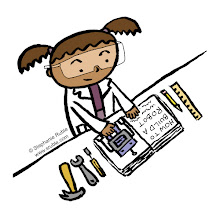Birdie Drawings
M.T. Anderson (keynote)
- Does some things just for artistic pleasure, not necessarily for the book or for marketing.
- “Those books that take us away from what we expect show us the world anew.”
- “Don’t be afraid of your eccentricities.” (Love that quote!)
Courtney Bongiolatti (on boy books)
- Recommended Guys Read website.
- She also recommended that you know your genre. Are you writing Action, Adventure, Fantasy, Mystery, Humorous Mystery, Sports, School Stories, Historical Fiction, Combination of Genres, Relatable, or Out of the Box?
- Boy books should have a boy main character, be about a kid that the reader wants to be like, and have series potential.
Carolyn Mackler (on characters)
- Quirks, details and language help define characters. Make them consistent throughout the book.
- Writing exercise: What does your character keep hidden in their underwear drawer, and if nothing, where do they hide things and what do they hide?
- “Number one challenge is figuring out what to omit. What you omit is more important than what you keep in the story.”
More Birdie Drawings
E.B. Lewis (keynote)
- “Keep forging forward – there is life after you feel like the inspiration has died.”
- “As artists you need to fill yourself up to overflowing and then give it all back.”
Gail Carson Levine (keynote)
- If a character is going to change, we have to see how it happens (the set up) or understand later how it came to be.
- Grow in the writing – as you write you get to know your characters better and develop them through writing.
- Writing exercise: 3 characters are getting ready for school. How does each one prepare? Reveal the thoughts and feelings of each; they should all be different.
Jon Scieszka (stories across multiple media)
- Websites, blogs, etc. that are mentioned in the book are live and each character has their own online presence. (Talking about his Spaceheadz books.)
- Multimedia platform books are a hard sell even for an established author, but more publishers are starting to look for these books.
- Fully half of his budget for the project goes for online efforts (the publisher pays someone to do the web stuff).
- His books stand alone without the web stuff so that schools and kids without web access can still read and enjoy the books.
Even More Birdie Drawings
Gennifer Choldenko (being your own best editor + keynote)
- “What you experience while you’re writing, we’ll experience as we’re reading.”
- “Every detail must work within the context of the world you created (essential part of every novel, not just fantasy).”
- “To make your novel fulfilling, you have to get to the emotional core.”
- “Start on a new project before revising the last one.” (Need multiple projects/ideas.)
- “Good work takes time and major revisions.”
- “If you find yourself not wanting to work on a chapter or a storyline, that’s a clue. Go where the heat is because if the heat is there for you, it will be there for the reader.”
Rachel Vail (keynote)
- Middle grade is where you start to go out and notice the larger world, not just your small family.
- “Life or Death moments are a dime a dozen in middle grade.”
- “Voice sometimes comes later after you’ve done a lot of work/pages.”
- Many middle grade and chapter books have a one act play structure.
The Rest Of The Birdie Drawings
Linda Sue Park – I was fortunate to be able to take the MG premium workshop with Linda Sue Park. Here are some gems from those sessions:
- In middle grade: “They’re learning that the world isn’t fair. What are they going to do about it? The world isn’t fair, but that doesn’t mean it has to be miserable.”
- Character (for her) has no substance without setting. Mix/balance emotions and setting with what makes them specific vs. what makes them universal. Setting helps make it specific.
- Character should have an internal and an external quest. Internal=what character needs (character development). External=what character wants (plot). Internal quest should be subtle.
- “Story doesn’t take place inside someone’s head; it takes place in the world.”
- Need to think about balance. Stuff can’t always just happen to them – character needs to make things happen. Plot progresses because of choices that the character makes that cause action.
- How much space in your story do you want to give to something out of the character’s control where they can’t act or react? (Probably not much. Example: getting swept down a river.) The reader is waiting for the character to act or react.
- “If your flashback is too long, maybe it’s not a flashback – it’s called flash.”
- Chapters are usually similar size. Short chapters make for quicker read and makes more impact.
- Love the process and what you’re doing. Enjoy the moments and the writing whether you get published or not.


No comments:
Post a Comment